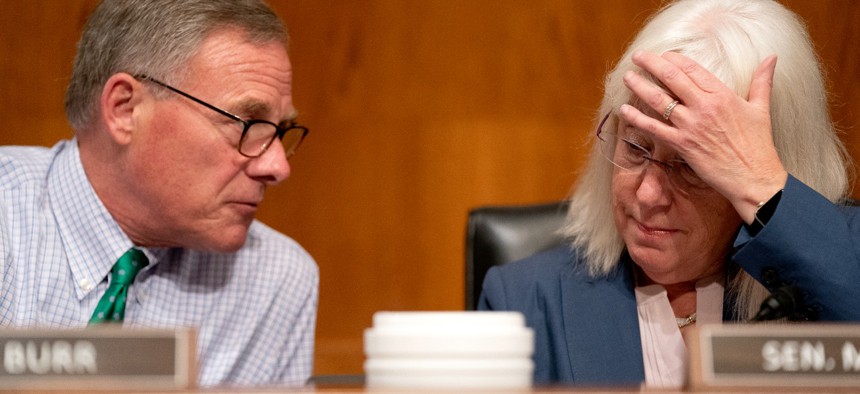
Sens. Richard Burr, R-N.C., left, and Patty Murray, D-Wash., have floated a draft proposal. Stefani Reynolds-Pool/Getty Images
Bipartisan Pair of Lawmakers Considers Reforms to CDC, Other Health Agencies
Making the CDC director a Senate-confirmed position is one provision in a new draft bill on pandemic preparedness.
As the country heads into year three of the coronavirus pandemic, a bipartisan pair of lawmakers is considering legislation to better prepare for public health emergencies such as by proposing actions to make the nation’s premiere public agency more accountable.
Senate Health, Education, Labor and Pensions Committee Chairwoman Sen. Patty Murray, D-Wash., and ranking member Sen. Richard Burr, R-N.C, released on Tuesday a discussion draft of the “Prepare for and Respond to Existing Viruses, Emerging New Threats, and Pandemics Act,” or “PREVENT Pandemics Act.”
“While our federal response has been successful in the fastest development and distribution of safe and effective vaccines and treatments against an emerging infectious disease, one of the biggest challenges we face is addressing the systemic and cultural failures of the [Centers for Disease Control and Prevention] under two administrations,” said Burr, in a press release. “Demanding accountability and transparency from the CDC is a critical first step to ensuring that the agency provides clear and timely recommendations that Americans find trustworthy.”
The draft bill would require Senate confirmation for the CDC director and establish “specific functions” for the position, said a summary. Similarly, Republican senators introduced a bill in September that would make the CDC director subject to Senate confirmation in order to increase accountability at the agency.
Other provisions related to the CDC in the bipartisan proposal include: requiring the agency to disseminate public health data standards within two years to help improve data reporting; requiring the director to testify annually before the Senate Health, Education, Labor, and Pensions and Energy and Commerce committees, unless the chair waives the requirement; directing the CDC leader to work with the other heads of related agencies to bolster efforts on advanced molecular detection and genomic sequencing of pathogens; and mandating the development of an agency-wide strategic plan every four years.
The strategic plan will detail “CDC’s priorities and objectives, the capabilities that need to be developed to achieve these objectives, and how CDC will leverage strategic communications, external partnerships, and coordination with other agencies,” said the summary. Also, the Government Accountability Office would review the agency’s compliance with the plan.
Earlier this month, the CDC held its first solo briefing in a while, following much confusion over its change in isolation guidance over the holidays. Director Dr. Rochelle Walensky said during that briefing she anticipates more in the future. Then she told The Wall Street Journal in an interview shortly thereafter she intends to improve her communication and has hired a media consultant to help her do so. She also said she plans to improve the CDC’s data collection, which has been a fragmented and slow process during the pandemic.
During the briefing on Wednesday by the White House COVID-19 response team and public health officials, a reporter asked if the Biden administration supports the provision in the draft bill to make the CDC director Senate confirmed, and asked Walensky if she believed this would increase the CDC’s accountability during future public health responses.
“We look forward to reviewing the bill and we appreciate the senators’ focus on pandemic preparedness,” said Jeff Zients, White House coronavirus response coordinator. “We’ll leave it to Congress to sort through the CDC director status of confirmation. And overall, we look forward to engaging with the Senate as the bill comes together.”
Walensky also said she’d review the bill and “echoed the gratitude.” She added her focus is “the pandemic that we have on our hands right now.”
The draft bill would allow the secretary of the Health and Human Services Department––which houses the CDC–– to directly appoint up to 250 individuals annually to response and preparedness positions when there is a public health emergency; establish an advisory committee to provide recommendations to the secretary on communication and sharing of information during public health emergencies; and require HHS to submit a report annually to Congress on pandemic preparedness, among other things.
The draft also has copious provisions for the other health agencies: the Food and Drug Administration and National Institutes of Health.
“After everything our nation has been through these past two years, we owe it to everyone who worked so hard to get us through this crisis to take every step we can to make sure we are never in this situation again, and that’s what this bill will help us get done,” Murray said.
The lawmakers are soliciting feedback on the draft until February 4.







